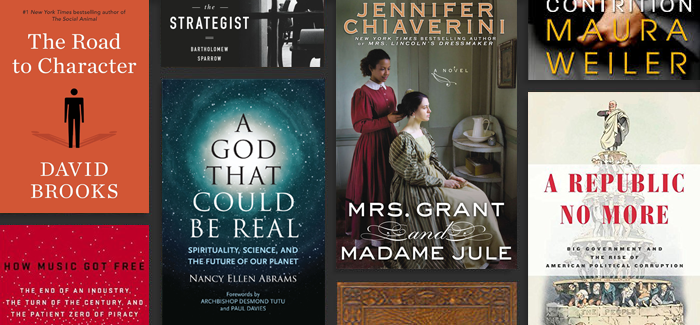
(Cover collage by Joy Olivia Miller)
The Magazine lists a selection of general interest books, films, and albums by alumni. For additional alumni releases, browse the Magazine’s Goodreads bookshelf.
A Republic No More: Big Government and the Rise of American Political Corruption
Jay Cost, AM’04 Author
America’s founders put checks and balances in the Constitution to keep any one part of the government from dominating the others. However, the 21st-century US government now has more power than those checks and balances can handle, argues political analyst Jay Cost. This not only allows lobbyists and special interests to have an inordinate influence, but also normalizes this corruption, according to Cost. From low corporate taxes to farm subsidies to high Medicare reimbursement rates, Cost explores the various results of institutionalized corruption in the US government—and how it’s getting worse.
Mrs. Grant and Madame Jule
Jennifer Chiaverini, AM’92 Author
When Julia Dent married future Union general Ulysses S. Grant in 1848, the plantation owner’s daughter insisted on keeping her childhood slave, Jule. In her latest historical novel, Jennifer Chiaverini imagines the relationship between the two women as the Civil War and a changing nation complicate their tenuous bond. Even after Jule seizes an opportunity for freedom, their paths continue to cross through the Grants’ White House years and beyond.
A God That Could Be Real: Spirituality, Science, and the Future of Our Planet
Nancy Ellen Abrams, AB’69 Author
While in recovery from an eating disorder, lifelong atheist Nancy Abrams found a surprising comfort and strength in imagining a higher power. She began to explore the possibility of a God that offers peace and wisdom without contradicting the rules of the universe astrophysicists like her husband are discovering. With forewords by Archbishop Desmond Tutu and physicist Paul Davies, A God That Could Be Real presents an unconventional, emergent deity—a God that derives from, but is more than, the sum of human aspirations.
The Road to Character
David Brooks, AB’83 Author
Instead of focusing on virtues that can be displayed on résumés, New York Times columnist David Brooks advocates for greater focus on the virtues discussed at funerals— kindness, bravery, honesty, faithfulness. Drawing on the lives of 10 historical leaders, Brooks offers a roadmap to true character that shows how reflection, humility, and self-discipline can increase our inner worth. Combining psychology, spirituality, politics, and Brooks’s own confessions, The Road to Character strives to show how to lead a fuller and more moral life.
Contrition
Maura Weiler, AM’93 Author
Everything changed for Dorie McKenna, the protagonist of Maura Weiler’s debut novel, when she made two startling discoveries: her biological father was a famous artist, and she was separated at birth from a twin sister, Catherine Wagner, who inherited their father’s talents. Dorie, a tabloid journalist, is eager to share Catherine’s paintings with the world. But as a cloistered nun, Catherine isn’t interested. Dorie’s quest takes her undercover in Catherine’s convent—and where the sisters clash over the meaning and purpose of art.
How Music Got Free
Stephen Witt, AB’01 Author
Just 20 years ago, people purchased all their music from brick-and-mortar stores—but the Internet has made even the concept of buying music seem like ancient history. The result of five years of investigative reporting, How Music Got Free chronicles the interwoven tales of three key players in the music piracy revolution: Karlheinz Bradenburg, inventor of the mp3; Doug Morris, CEO of Universal Music Group; and Dell Glover, the “Patient Zero” of music piracy who leaked nearly 2,000 albums. Through these narratives, Stephen Witt depicts the moment in history when music became forever entwined with the world online.
The Strategist
Bartholomew Sparrow, PhD’91 Author
Brent Scowcroft has helped shape US foreign policy for more than four decades as an Air Force lieutenant general, military assistant under President Richard Nixon, and national security adviser under presidents Gerald Ford and George H. W. Bush. At age 89, he continues to advise leading policymakers on both sides of the aisle. But who is Brent Scowcroft? With the subject’s full cooperation, political scholar Bartholomew Sparrow unveils a detailed—and unprecedented—portrait of this little-known “wise man” of Washington and his influence on American foreign policy.
